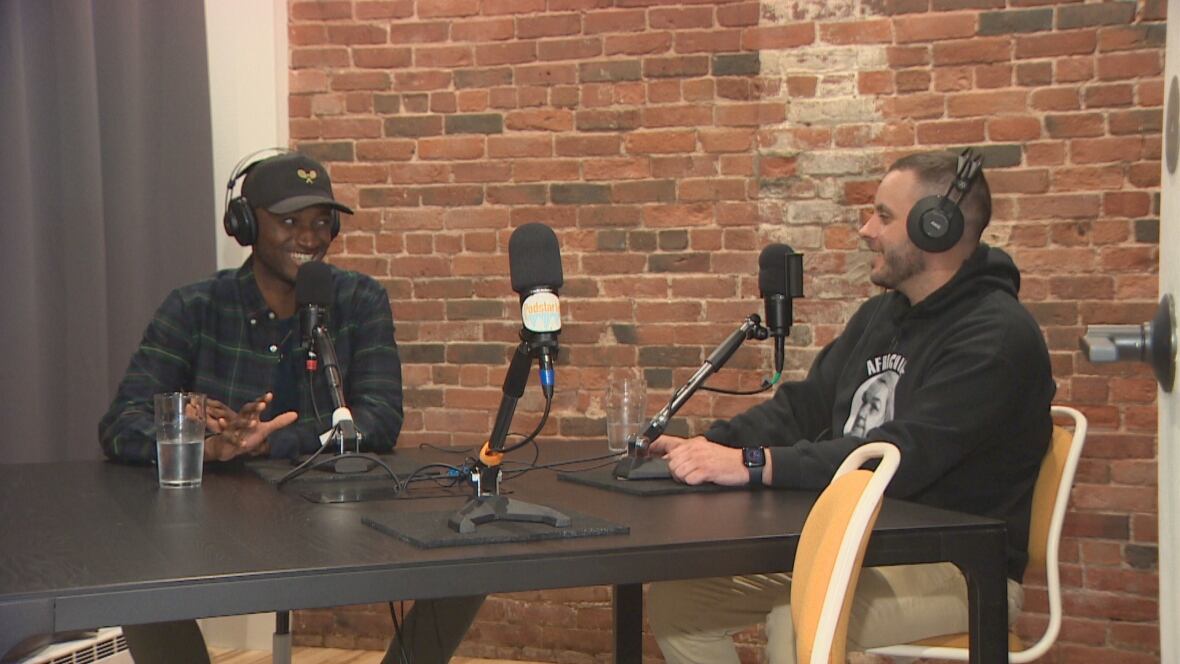Podcast on historic Black community in Halifax makes Amazon Music's best of 2022 list
Africville Forever tells the story of a neighbourhood demolished by city authorities

Just six months after the podcast first dropped, Africville Forever co-hosts Alfred Burgesson and Eddy Carvery III are celebrating the newest acclaim for the series.
The podcast, which tells the story of a former Black community in Halifax, has been named one of Amazon Music's best podcasts of 2022. Artwork for the series was recently splashed up on billboards in Toronto's Yonge-Dundas Square.
Since the podcast's release, Burgesson said he's seen first-hand how the series has found an audience in the city and beyond.
"It's been really great. I think I've seen the response … in action," he said, adding that he and Carvery have heard from listeners who made the trip out to Africville for the first time after listening to the series.
"To know that people are listening to this story and it's actually bringing them to Nova Scotia and bringing them to Halifax, bringing them to Africville to learn more about it," Burgesson said, has been encouraging.

Spreading the story of the community and its descendants to a larger audience is exactly what the pair, and the team behind Africville Forever, hoped to accomplish, Carvery said.
"We wanted to be respectful of the descendants of Africville and the pain and everything that they went through and how hard it is sometimes to get them to come out and share their stories like they did within the podcast," Carvery explained.

"Alfred and I have been down in Africville from time to time, and we've actually met people on the lands of Africville that have come up to us and said, 'We've listened to that podcast. We're going to the church to learn more about Africville. We're here to take pictures to try to experience that feeling that was presented within the podcast,'" Carvery said.
The podcast's artwork was created by Halifax-based artist Vanessa Thomas, whose grandmother lived in Africville. She said she's proud to be a part of the project and have her work recognized.
"It's a good Christmas present," she said with a laugh. "I'm just happy that the message of Africville is being shared around Canada and wherever else it might land because it's an important story. I feel proud that we were able to make it happen and have such success."

History of the community
The five-part series takes listeners through the history of the Black community — which sat in the northernmost tip of the Halifax peninsula — and introduces them to some of the figures who have been fighting for its recognition over the last several decades.
Home to about 400 residents at its peak, Africville was originally settled in the 1840s, according to data from the city. The dissolution of the community began in the 1960s, when Halifax city council set out on an "urban renewal" plan, which involved removing housing and other structures in the area and relocating residents to other parts of the city. Today, a park and a replica church sit where the community used to rest.
Upcoming African Heritage Months events will hopefully give the pair the chance to give the podcast more momentum, Burgesson said, and could offer the Africville Forever team opportunities for outreach to other descendants or promoting dialogue about the series in city schools.
Burgesson also mentioned he and Carvery are "engaging with various stakeholders that have influenced Africville" to ask about future plans for the area.

"Eddy and I are working together in community and with stakeholders really trying to move the needle forward and really trying to get people to actually just do something," Burgesson said. "I would say there's been relatively positive response from those stakeholders. However, there's still not enough action."
Carvery said there's also the opportunity to dig deeper into the trajectories of the community's descendants by highlighting efforts to have the land returned to them and a possible vision for what a new Africville could look like.
"I think it's probably only going to get even wilder," Burgesson said. "I hope the reach continues, I hope the interest continues. I hope that it moves people to visit. I hope that it continues to move people to ask questions."
Africville Forever is available on the show's website, Amazon Music, Apple Podcasts and wherever else you get your podcasts.
For more stories about the experiences of Black Canadians — from anti-Black racism to success stories within the Black community — check out Being Black in Canada, a CBC project Black Canadians can be proud of. You can read more stories here.


